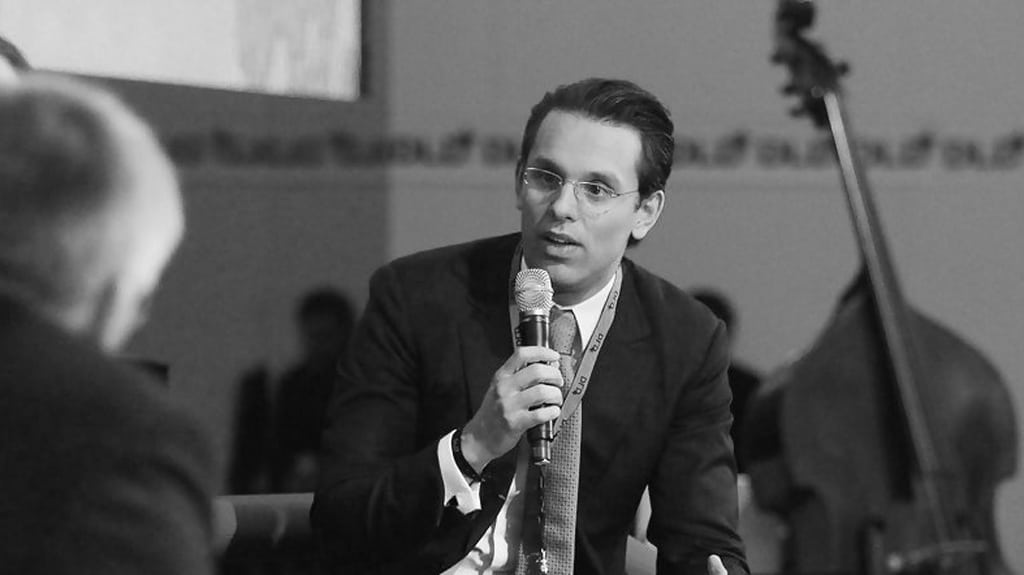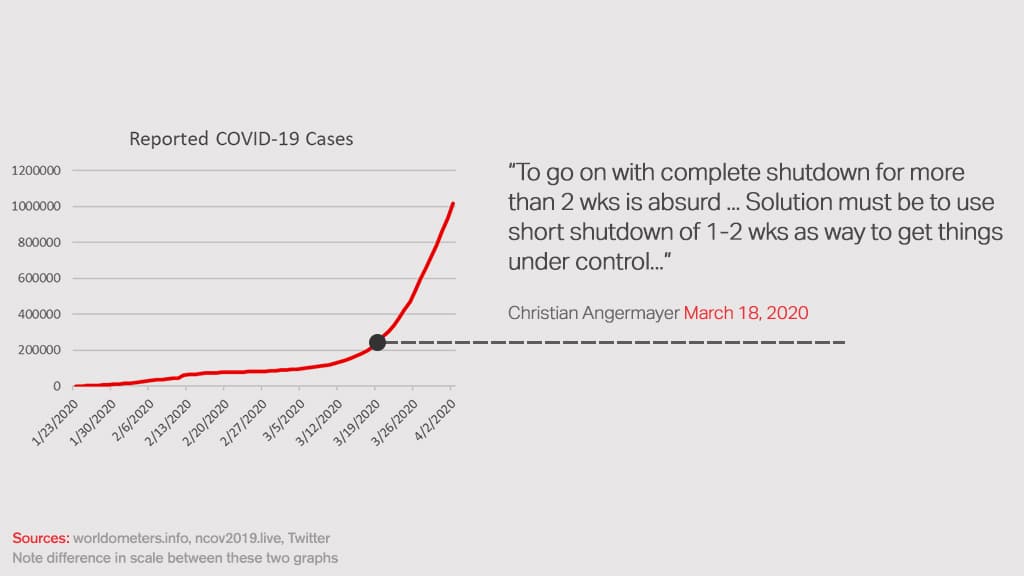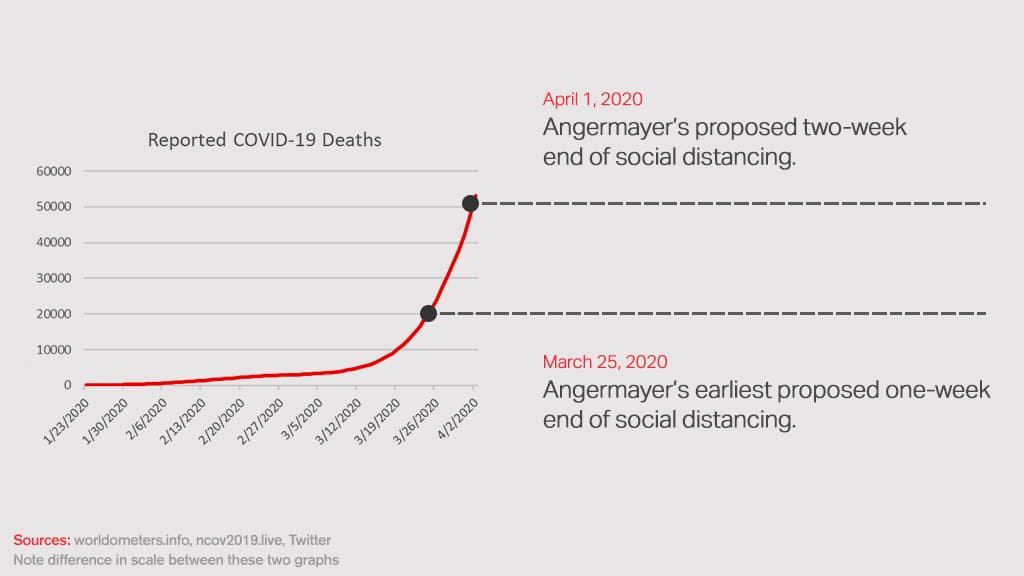
While the coronavirus continues to claim lives, the best epidemiologists currently have to offer are non-pharmaceutical interventions (NPIs) like self-quarantine and social distancing. Although this is a frustrating and dangerous global situation, NPIs slow the rate of infection to avoid overwhelming the capacity of local health facilities everywhere. This is referred to as “flattening the curve.” Despite extensive evidence of its efficacy, Donald Trump recently joined a number of tech entrepreneurs in calling for the use of barely-tested COVID-19 drugs—the long-standing antimalarials chloroquine and hydroxychloroquine—in the hopes of getting people back to work and mitigating the pandemic’s economic fallout.
[This is part 2 of a 3-part series. Click here to read part 1. Click here to read part 3.]
In this context, psychedelic capitalists are acting as Trump surrogates. Christian Angermayer, multimillionaire, venture capitalist, and largest individual stakeholder in for-profit psychedelic medicalization, decided to get in on the action and signal his allegiance to the Party of Death. He’s promoted a dubious “non-study” and used it to call for widespread treatment with chloroquine and hydroxychloroquine on his various social media channels and other outlets. You can read more about the “non-study’s” main author, Gregory Rigano—who is neither a scientist nor a medical doctor, but actually an attorney—in this critical Wired article.
At least one new small-scale (and uncompelling) study has contradicted the small-scale (uncompelling and flawed) French study (and the flawed follow-up study) Angermayer has been touting. Since Silicon Valley and Trump started making questionable claims about these drugs, at least one person has died due to misinformation, several people have been non-fatally poisoned, and there’s been a run on chloroquine and hydroxychloroquine (preventing some with chronic conditions, like lupus, from accessing a vital drug with proven efficacy for their conditions).
We recently took to Instagram and Twitter to highlight some perspectives on coronavirus offered by Angermayer. We’ve already shared some of his past social media commentary—such as his desire to criminalize sugar, mockery of teenage climate activist Greta Thunberg, and high praise for President Trump for his assassination of Qasem Soleimani. This time, Angermayer’s responses painted a more troubling picture.
This comment is bullshit. Flattening the curve is a public heath approach to save lives and avoid overwhelming hospitals and health care facilities. @ATAI_life @COMPASSPathway @HopkinsMedicine @WHO https://t.co/IDKrNPEwtA https://t.co/kgQiKGq4uk
— Psymposia (@psymposia) March 22, 2020
Writing on Twitter requires brevity, often at the cost of context and nuance, so we’d like to elaborate on our positions here. Angermayer’s cost-benefit analyses on the safety of drugs have consequences, especially as he positions his companies to dominate the nascent “psychedelic healthcare industry,” and it’s worth pushing back on them when so many lives are at stake.
If it feels bizarre to watch the world’s largest psychedelic pharmaceutical investor advocate for public health policies that would exacerbate health disparities, perhaps it’s worth remembering that—when it comes to big pharma—this is nothing new. There’s a reason Secretary of Health and Human Services, Alex Azar, refused to guarantee a coronavirus vaccine would be affordable for all, stating, “we can’t control that price because we need the private sector to invest… Price controls won’t get us there.” It seems some people believe there’s a need to “patent the sun.”
You offer a false dichotomy btwn flattening the curve & “flattening the disease.” And, you posted chloroquine not hydroxychloroquine. Accuracy matters when claiming solutions for pandemic. Humans aging well>tweets aging well https://t.co/oPW3BFt0YX
— Psymposia (@psymposia) March 23, 2020
Chloroquine and hydroxychloroquine, which Angermayer references earlier in the thread, are immaterial to his assertion that “‘flattening the curve’ is complete BS because our society and economy will not survive such a thing.” This economic fixation is concerning, as it leads to “spray and pray” approaches that subordinate public health to “economic health.” For example, on March 20th, Angermayer stated that “we need chloroquine for everybody,” despite a lack of evidence as to its efficacy for coronavirus. Evidence is still lacking at the time of publication, even as numerous countries scramble to highlight the side effects of these drugs (side effects Angermayer has repeatedly downplayed or ignored).
You’re backpedaling. Flattening curve aims to avoid hospital overload until vaccine development. You’re fixating on economic “damage” & calling 7-14 day lockdown citing cherry-picked “civil rights,” not health outcomes. pic.twitter.com/RRZm4YU63m
— Psymposia (@psymposia) March 23, 2020
Angermayer argues that efforts to flatten the curve are harmful over time, with the worst effects impacting the “weakest” members of society. Not only does this conflate abstract economic health with public health, it’s also out of step with the consensus of epidemiologists struggling to contain the pandemic. Additionally, it raises the basic question of whether economies serve humans or humans serve economies. In the modern caste system of neoliberalism, the “weakest” members of society are not actually served by the economy. While Angermayer’s stance may sound benevolent, a number of his other tweets—alongside an interview and an essay he authored—suggest that his primary concern lies with the “health” of the economy rather than that of human beings.
This view is wholly consistent with Angermayer’s global business approaches, including his willingness to do business with at least one dictator in Africa. Angermayer is a member of the Presidential Advisory Council to Paul Kagame, the authoritarian ruler of Rwanda, whose political opponents have been murdered and disappeared, and under whose rule Rwanda’s capital city of Kigali has forcibly removed “undesirables”—the poor, sex workers, street vendors—to detention centers, according to Human Rights Watch. Kagame has been described by New York Times Magazine as “The Global Elite’s Favorite Strongman.”

By now it’s public knowledge that the main objective of “flattening the curve” is to avoid overwhelming healthcare services while researchers work on developing a vaccine. Although the coronavirus pandemic has already demonstrated the public health necessity of social distancing for periods of more than two weeks in numerous countries, Angermayer claims such timelines are “absurd” and violate “any civil rights we fought for.” Angermayer appears to be prioritizing “freedom to move” over “the right to life.” It’s unclear what civil rights struggles Angermayer has personally participated in and, in this context—in addition to his willingness to serve murderous dictators—it’s also worth noting that he’s been a vocal opponent of psilocybin decriminalization.
Non-pharma interventions are safe and 14-21 days is not enough. See Italy. See UK. Re: other posts – “Harsh” isolation of elderly/ill has already been shown ineffective at halting the spread. China tried quarantining only sick—failed. pic.twitter.com/svydFJDRJQ
— Psymposia (@psymposia) March 23, 2020
Angermayer’s position aligns him with far right demagogues who have misjudged and downplayed the coronavirus crisis, like Glenn Beck, Texas Lieutenant Governor Dan Patrick, and President Trump. It had long been clear to numerous medical professionals that 7-21 days was madness, and the evidence is now overwhelming to the point that even Trump has been forced to backpedal.
We didn’t falsify/tweak. “Complete BS” was your statement. Our OP linked your thread. The context for claiming “‘Flattening the curve is complete BS” is *your* economic agenda. Herd immunity was rejected. Context: https://t.co/7w8cwwg33I pic.twitter.com/s9l2xhhuGb
— Psymposia (@psymposia) March 23, 2020
Accusations of us tweaking, falsifying, and unfairly excerpting his tweet are without merit.
Accepted. Count on us doing what we do in the meantime. Assuming you’re still interested post-crisis, we’re game.
— Psymposia (@psymposia) March 23, 2020
We accept Christian Angermayer’s invitation to a public debate on psychedelics and his approach to the field, once it’s safe to be face-to-face.
We’re agnostic on off-labels. We oppose threat models that fixate on abstract “economic damage” & devalue systemic human suffering/patient impacts. Is this the rigor you’ll apply to psychedelic studies? Human health>economic health.
— Psymposia (@psymposia) March 23, 2020
Angermayer asserts we should “get behind the research” of various off-label drugs that are being explored for use against COVID-19. This is a misleading statement, as there’s very little research as to the efficacy of these drugs for the purposes Angermayer is promoting. We are withholding our conclusion until there’s research we can get behind. We’re advocating for maintaining proven NPI strategies in the meantime.
One reason we’re agnostic about these drugs is that they have significant side effects, including death. Angermayer repeatedly ignores this while glossing over the fact that chloroquine “can cause cardiac arrest, low blood pressure, hypoglycemia, seizures, and an altered mental state.”
(Given that his company, ATAI Life Sciences, just announced a joint venture looking at ibogaine—an alkaloid found in Tabernanthe iboga—for opioid use, Angermayer’s lack of comment on chloroquine’s potentially deadly effects on QT interval is concerning in light of ibogaine’s effects on QT interval and the related deaths.)
To be clear, we’re not opposed to chloroquine or hydroxychloroquine—the evidence is pending. What we’re opposed to is promoting the widespread use of unproven medications (especially those with serious side effects in certain population subsets) for COVID-19 treatment—while downplaying social distancing—in an effort to re-start the economy as the virus is peaking.
These are not the same experts, 50 yrs later. You’re confused: we criticize capitalism & advocate full decrim. Politicians (not scientists) made psychedelics illegal. And Nixon was no expert. Psychedelics are illegal despite the science.
— Psymposia (@psymposia) March 23, 2020
Angermayer decides to play fast and loose with some “alternative facts” here. Politicians enacted comprehensive prohibition with the Controlled Substances Act of 1971. His claim that those “experts” who made psychedelics illegal are “the same experts…holding back” hydroxychloroquine as a treatment for COVID-19 is absurd. Conflation and falsehoods aside, statements like these spotlight his neoliberal attitudes towards regulatory agencies designed to protect public health.
In a fatal bid to end social distancing as soon as possible and re-start the economy, Angermayer is calling for dosing large numbers of people with drugs that are essentially untested for COVID-19. If he’s right, he will be able to claim that the FDA is a needlessly bloated bureaucracy that impeded a breakthrough in a time of crisis. If he’s wrong, numerous people will experience a variety of “side effects” for absolutely no reason, but he can claim his gamble was necessitated by the crisis. Heads he wins, tails we lose.
Regulatory agencies exist to safeguard public health. The unfortunate relationship between LSD prohibition and the thalidomide disaster demonstrates past failures of regulatory agencies with regards to both public health and psychedelics. We’re not suggesting that chloroquine or hydroxychloroquine are anywhere near as dangerous as thalidomide, we’re simply emphasizing why regulatory bodies exist in the first place. While extraordinary times do call for extraordinary measures—and while anecdotal evidence and small-scale studies should not be ignored—disregarding scientific rigor and public safety for purely economic reasons is indefensible.
We don’t support medicalization (and its status quo of incarceration) over complete decriminalization, and we don’t support mass-medicating with drugs for understudied applications. Whether dealing with prohibition or pharmaceutical interventions for pandemics, we support evidence-based approaches to drug policy and medicine.
We’re obsessed with patents? We have exactly zero. How many do you have? You reveal a fixation on economic motivations we’d expect from a Hayek devotee. How about taking a page from Dr. Salk’s playbook? Could you patent the sun?
— Psymposia (@psymposia) March 23, 2020
There is a lack of evidence for the efficacy of chloroquine and hydroxychloroquine in the treatment of COVID-19. This is why there’s a lack of widespread or rapid adoption. All of the evidence Angermayer cites falls well below commonly-accepted baselines for medical research. But then, Angermayer’s view of researchers is not positive: “Bureaucrats and scientists always want to do ‘more studies’. This is how they justify their jobs.” Meanwhile, we’re seeing the efficacy of non-pharmaceutical interventions demonstrated in real time.
Despite lacking any training to prescribe medical advice, Angermayer is comfortable proclaiming “we need chloroquine for everybody.” We reiterate: it makes no sense to scale back evidence-based social distancing measures on an unproven gamble.
Even if the slow adoption of chloroquine and hydroxychloroquine were related to patents rather than a lack of evidence (a dubious proposition), that scenario would simply underscore the inability of Angermayer’s companies (and the rest of the pharmaceutical industry) to actually operate in the interests of public health. As such, ATAI’s stated claim of seeking “to ultimately cure mental health disorders” must be recognized as a false premise—not only by the researchers it’s attempting to lure, but by psychedelic communities in general.
A final thought on patents: Martin Shkreli’s price gouging of daraprim alerted the public to the horrific absurdities of for-profit medical pricing, as did Mylan’s price gouging of EpiPen. Hepatitis C activist Greg Jefferys was alerted by Gilead’s $84,000 price tag on sofosbuvir that actually cost less than $60 to manufacture. And he’s not alone. The Four Thieves Vinegar Collective’s response to this patent insanity has been to create DIY medications, including versions of Daraprim and epipens. No matter what brought medical price gouging to people’s attention, the reality is that the US spends twice as much as other countries, with worse results.
Trump admin is killing people with inaction, misinformation, and lies, claiming chloroquine is FDA approved for CV19 or “hundreds of thousands of people that get better, just by..sitting around and even going to work.” pic.twitter.com/BGTRHyjffR
— Psymposia (@psymposia) March 23, 2020
At the time of publication, there have been few case reports and even fewer studies on chloroquine or hydroxychloroquine and coronavirus in vivo. Additionally, we are unaware of any COVID-19-related studies for either drug that don’t raise significant methodological questions.
As we previously mentioned, Angermayer’s initial promotion of mass-medicating with these compounds was based on a Google Document that was primarily authored by an attorney and disavowed by Stanford University. Angermayer followed that up by citing controversial case studies with small sample sizes and anecdotal reports from the front lines. We can ignore Trump’s take on this entirely (listen at your own peril); the science just isn’t there right now.
We’re not opposed to anything that works & has been scientifically vetted. We’re opposed to economic “imperatives” that dismiss proven mitigation strategies (such as physical distancing) in order to play Russian roulette with public health.
— Psymposia (@psymposia) March 23, 2020
We’re interested in evidence-based solutions for this pandemic, not social media clout. Science requires evidence accumulated over time and a willingness to be wrong. One of our major issues with these statements and attitudes (regardless of how they age) is the dismissal of demonstrably effective NPIs due to an abstract imperative to protect “economic health.”
Angermayer’s position mirrors startup culture’s mantra of “disrupt everything,” in service to this economic imperative. But rather than playing coronavirus roulette with public health and racing to get the economy “raring to go by Easter”—or in Angermayer’s case, three weeks earlier—we’re in favor of prioritizing individual and community health. As are 81% of Americans.
The coronavirus pandemic demonstrates the failures of capitalism, most notably its rampant health and wealth inequality. This isn’t about getting back to business as usual—business as usual is responsible for the crisis at hand. This is about putting people over profits and creating fundamentally new social relations.
And as for tweets aging well…
And as for tweets aging well…


Hey! Before you go… Psymposia is a 501(c)(3) non-profit media organization that offers critical perspectives on drugs, politics, and culture. We strive to ask challenging questions, and we’re committed to independent reporting, critical analysis, and holding those who wield power accountable.
Our perspectives are informed by critical analysis of the systemic crises of capitalism that have directly contributed to the unmitigated growth of addiction, depression, suicide, and the unraveling of our social relations. The same economic elite and powerful corporate interests who have profited from causing these problems are now proposing “solutions”—solutions which both line their pockets and mask the necessity of structural change.
In order for us to keep unpacking these issues and informing our audience, we need your continuing support. You can sustain Psymposia by becoming a supporter for as little as $2 a month.
Plus Three
The Plus Three podcast is Psymposia co-founder Brian Normand, Medicine, Society and Culture Editor, Nese Devenot, Politics and Ecology Editor, Brian Pace, and Managing Editor, David Nickles. Plus Three goes deep into the world of drugs, from local decriminalization and emerging psychedelic corporations to leftist politics and mass incarceration. Each week the team and guests attempt to make sense of the complex connections between drugs, science, capitalism, policy, and culture.